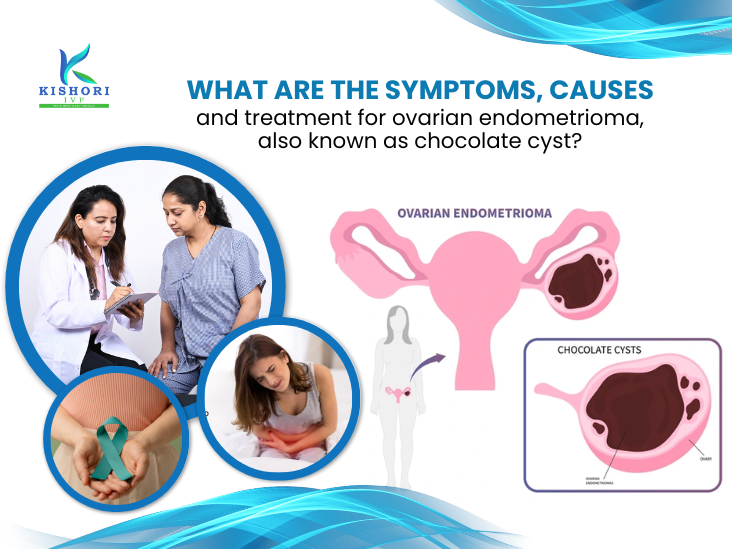
What are the symptoms, causes, and treatment for ovarian endometrioma, also known as chocolate cyst?
A chocolate cyst, also known as an ovarian endometrioma, forms within the ovaries due to a condition called endometriosis. Endometriosis is when the tissue lining the uterus (the endometrium) starts growing outside the uterus, often affecting the ovaries. This leads to the development of blood-filled cysts, which are referred to as chocolate cysts. These cysts can cause pain and various complications for women.
Chocolate cysts primarily affect women of reproductive age, typically between their late teens and early 40s. However, they can occur at any age after menstruation begins. Women with a history of endometriosis are at a higher risk of developing these cysts.
Chocolate cysts can vary in size and severity. They are usually categorized into three types:
- Small Cysts: These are typically smaller than 4 centimeters in diameter.
- Medium Cysts: Ranging from 4 to 8 centimeters in diameter.
- Large Cysts: Larger than 8 centimeters in diameter and can be quite extensive.
- The size and type of cyst can influence the symptoms and treatment approach.
The primary cause of chocolate cysts is endometriosis. While the exact cause of endometriosis remains unclear, several theories suggest that retrograde menstruation, immune system dysfunction, hormonal factors, and genetic predisposition may play a role in its development.
Recognizing the symptoms of chocolate cysts is crucial for early diagnosis and intervention. Common symptoms include:
- Pelvic Pain: The most prominent symptom, often felt as a dull, aching pain that can be severe during menstruation.
- Menstrual Irregularities: Including heavy or irregular periods.
- Painful Intercourse: Dyspareunia can occur due to the presence of cysts.
- Pelvic Discomfort: This may worsen during activities like exercise or bowel movements.
- Infertility: Chocolate cysts can hinder fertility, making it difficult to conceive.
Chocolate cysts can significantly impact female fertility. The adhesions and scarring caused by endometriosis can interfere with the normal functioning of the ovaries and fallopian tubes, making it challenging for an egg to be released, fertilized, or travel to the uterus. This can lead to infertility issues in affected women.
To diagnose a chocolate cyst, healthcare professionals use various methods, including:
- Medical History: Gathering information about symptoms, menstrual cycles, and family history.
- Physical Examination: A pelvic exam can reveal cysts or abnormalities in the reproductive organs.
- Imaging Tests: Transvaginal ultrasound and MRI scans provide detailed images of the cysts.
- Laparoscopy: A surgical procedure to directly visualize and biopsy the cysts, often necessary for confirmation.
The treatment of chocolate cysts aims to relieve symptoms, preserve fertility, and prevent recurrence. Depending on the severity and individual circumstances, treatment options may include:
- Pain Management: Over-the-counter pain relievers or prescription medications can help manage pain and discomfort.
- Hormone Therapy: Birth control pills or hormonal medications may be prescribed to regulate menstrual cycles and reduce cyst growth.
- Surgery: Laparoscopic surgery can be performed to remove the cysts and any surrounding endometriotic tissue. In more severe cases, a partial or total hysterectomy may be considered.
- Fertility Preservation: If fertility is a concern, a conservative surgical approach can be taken to remove cysts while preserving reproductive organs.
- It is essential to consult with a healthcare provider to determine the most appropriate treatment plan based on individual needs and goals.
Chocolate cysts, or ovarian endometriomas, are a challenging aspect of endometriosis that can affect women’s reproductive health. Understanding the causes, symptoms, diagnosis, and treatment options is crucial for managing this condition effectively. If you or someone you know is experiencing symptoms of chocolate cysts, seek medical advice promptly to address the issue and explore the best course of action.
Call/Whatsapp: 7608-961-332/7381-060-332 to book an Appointment
Follow us on Facebook and Instagram for more:

